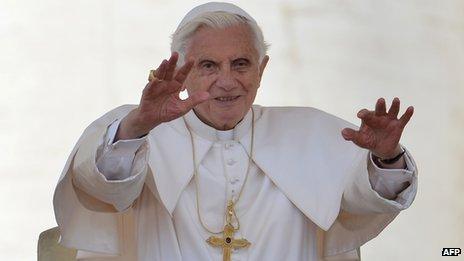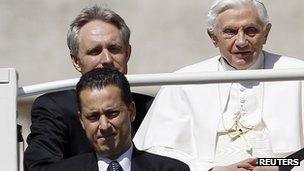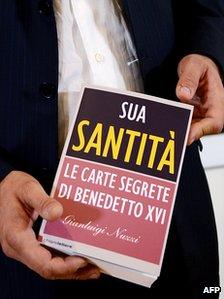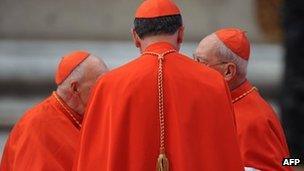Leaks and power plays in Vatican City
- Published

A book reproducing the private correspondence of Pope Benedict XVI has angered the Vatican and forms part of a series of leaks revealing allegations of corruption and internal conflicts.
Pope Benedict complained bitterly at his latest general audience about the international media. He said they had unfairly latched on to the admittedly very unusual story of the arrest of his butler, to distort the truth about recent goings-on at the Catholic Church's power centre here in Rome.
Yet he looked saddened and understandably angry about this invasion of his privacy in his own home on the top floor of the Apostolic Palace.
Every day, the Italian media give their latest versions about what they call the "Vatileaks" crisis which has been headline news.
The unfortunate butler in whose grace-and-favour home, just inside the walls of the Vatican, police found a stash of confidential documents from the Pope's private office has been held incommunicado since his arrest.

Butler Paolo Gabriele (bottom left) has pledged "full co-operation" with the investigation
The unanswered question is: for whose benefit did he acquire this mass of correspondence, some of it quite recent.
During the pontificate of the late Pope John Paul II, we now know that some Polish prelates working inside the Vatican were passing confidential internal documents to Moscow via Warsaw.
The Vatican has always been targeted by spies - as we also know from the memoirs of the British Ambassador to the Holy See during World War II. The ambassador lived inside Vatican territory during the German occupation of Rome.
But the latest outbreak of whistleblowing, and spying inside the Vatican is on a scale without precedent in living memory.
The "moles" which have been burrowing into the Vatican's contemporary archives and the personal papers of the Pope - the Italians also call them "corvi" or "crows" - seem intent not so much on discrediting the Pope himself, but rather his number two, Cardinal Tarcisio Bertone.
Reading between the lines, we have an image of an organisation with little internal cohesion, and some very frustrated personal egos.
Vatileaks is quite different from Wikileaks because we are dealing here with hard copy, actual letters, not e-mails or electronic records.
Although the Vatican is fully computerised and has its own secure mobile phone network, the Pope himself does not work in front of a computer screen.

Nuzzi's book contains correspondence leaked from several sources
He writes by hand, minuting correspondence he has seen with a letter "B" followed by the Roman numeral "XVI".
What emerges from the photocopies of Papal correspondence published in Gianluigi Nuzzi's book is that when the Pope receives letters they are often handed direct to his secretary by intermediaries. They do not necessarily arrive in his office through the Vatican mails.
Mr Nuzzi writes in his book that his Vatileaks come from at least three separate sources inside the Vatican.
So narrowing the seach for the "moles" or the "crows'" should not prove an insuperable task for investigators.
The very small number of employees holding positions of confidence within the headquarters of the Catholic Church makes any comparison with the government of a normal state, say the Italian state, quite meaningless.
The Vatican City State has a tiny resident population of fewer than 1,000 cardinals, bishops and monsignori and their staff, sleeping inside its walls when the gates close every night shortly after 11pm.
During the day, several thousand other Vatican employees come in and out of Vatican territory, the most senior of them parking their cars in the imposing Belvedere courtyard.
An interesting clue to the tectonic power shifts inside the Vatican, which continue as the Ratzinger papacy enters its eighth year, comes from an Italian blogger quoting an anonymous senior cardinal.
While the American cardinals and bishops declare war on President Obama over questions of religious freedom and the right to life, this cardinal says, inside the Vatican the cardinals are at war with each other.

The Vatican has denied any cardinals are involved in the leaks
At a private birthday lunch Pope Benedict was overheard to remark: "These Italians, why are they always disturbing the Pope with their Italian quarrels?"
The College of Cardinals which will elect Pope Benedict's successor was skewed unfairly towards Italians when the last bunch of red-hat promotions were announced.
Italians still hold an undue proportion of votes and influence in a Church which is increasingly seen to be shifting south - away from its former Eurocentric mould.
The Pope intends to redress this imbalance by bringing more foreigners into Church governance, and increase the chances that when the white smoke goes up again to announce his successor, yet another non-Italian Pope might appear on the balcony of Saint Peter's to the acclaim of the faithful.
<bold>How to listen to From Our Own Correspondent</bold> <bold>:</bold>
<bold>BBC Radio 4: </bold>A 30-minute programme on Saturdays, 11:30 BST.
Second 30-minute programme on Thursdays, 11:00 BST (some weeks only).
<link> <caption>Listen online</caption> <url href="http://www.bbc.co.uk/programmes/b006qjlq" platform="highweb"/> </link> or <link> <caption>download the podcast</caption> <url href="http://www.bbc.co.uk/podcasts/series/fooc" platform="highweb"/> </link>
<bold>BBC World Service: </bold>
Hear daily 10-minute editions Monday to Friday, repeated through the day, also available to <link> <caption>listen online</caption> <url href="http://www.bbc.co.uk/programmes/p002vsng" platform="highweb"/> </link> .
Read more or <link> <caption>explore the archive</caption> <url href="http://news.bbc.co.uk/1/hi/programmes/from_our_own_correspondent/archive/default.stm" platform="highweb"/> </link> at the <link> <caption>programme website</caption> <url href="http://news.bbc.co.uk/1/hi/programmes/from_our_own_correspondent/default.stm" platform="highweb"/> </link> .